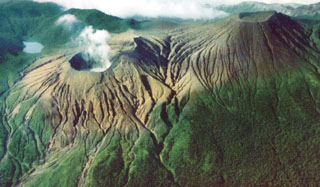Report on Rincon de la Vieja (Costa Rica) — January 2023
Bulletin of the Global Volcanism Network, vol. 48, no. 1 (January 2023)
Managing Editor: Edward Venzke.
Research and preparation by Paul Berger.
Rincon de la Vieja (Costa Rica) Continuing frequent weak phreatic explosions during July-December 2022
Please cite this report as:
Global Volcanism Program, 2023. Report on Rincon de la Vieja (Costa Rica) (Venzke, E., ed.). Bulletin of the Global Volcanism Network, 48:1. Smithsonian Institution.
Rincon de la Vieja
Costa Rica
10.83°N, 85.324°W; summit elev. 1916 m
All times are local (unless otherwise noted)
Rincón de la Vieja is a volcanic complex in Costa Rica with a hot, convecting acid lake that exhibits frequent weak phreatic explosions, gas-and-steam emissions, and occasional elevated sulfur dioxide levels (BGVN 45:10, 46:03, 46:11). This report covers activity during July-December 2022 and is based on weekly bulletins and occasional daily reports from the Observatorio Vulcanologico Sismologica de Costa Rica-Universidad Nacional (OVSICORI-UNA).
During this period, OVSICORI-UNA reported that eruptive activity continued similar to recent years, with weak phreatic explosions and gas-and-steam emissions generating plumes above the lake (table 8). The sulfur dioxide levels were generally stable at 30-50 metric tons/day (t/d) during July-October, with isolated peaks up to 600 t/d. In early November, isolated peaks of 750 t/d were measured, and thereafter levels varied widely. On 18 November the level peaked at 1,500 t/d. Toward the end of December, the level was about 250 t/d.
Table 8. Summary of activity at Rincón de la Vieja during July-December 2022. Some eruptions that failed to eject lake water and sediments outside the crater were not considered by OVSICORI-UNA as having an explosive character, so eruptive activity terminology is variable. Explosions were weak and phreatic. Courtesy of OVSICORI-UNA (compiled from weekly bulletins and occasional daily reports).
| Date | Time | Description of Activity |
| 05 Aug 2022 | -- | Eruption with small emissions. |
| 15 Aug 2022 | -- | Submarine explosion with no surface manifestation. Several other small eruptions occurred during mid-August. |
| 16 Aug 2022 | -- | Two explosions. |
| 22 Aug 2022 | -- | Eruption. |
| 01 Sep 2022 | 1900 | Eruption. |
| 08 Sep 2022 | 1510 | Explosion produced a gas-and-steam plume that rose 500 m above crater rim. |
| 10 Sep 2022 | 0640 | Explosion. Continuous gas-and-steam plumes. |
| 14 Sep 2022 | 0147 | Explosion produced a gas-and-steam plume that rose 600 m above the crater rim. |
| Mid-Sep 2022 | -- | Eruptions, with gas-and-steam plumes rising to about 800 m above crater rim. |
| 17 Sep 2022 | 0900 | Possible explosion(s), though not visually confirmed. Possible emission record at 0219. |
| 03 Oct 2022 | 1527 | Explosion. |
| 04 Oct 2022 | 1923 | Explosion lasting two minutes but not visually observed due to darkness and weather conditions. |
| 05 Oct 2022 | -- | Eruption. |
| 08 Oct 2022 | 1647 | Small gas-and steam emissions. |
| 09 Oct 2022 | 0940 | Small gas-and steam emissions. |
| 20 Oct 2022 | 0724 | Eruption. |
| 23 Oct 2022 | -- | Phreatic eruption. |
| 19-25 Nov 2022 | -- | Five explosions during week. |
| 25 Nov 2022 | 1432 | Explosion sent a steam-rich plume 2 km above crater rim that drifted SW. Sulfur dioxide anomaly was registered at a station W of the crater. |
| 25-30 Nov 2022 | -- | Twelve phreatic eruptions (including the 25 Nov indicated above, which was the most energetic). |
| Early Dec 2022 | -- | Several explosions, including one on 7 Dec. |
| 14 Dec 2022 | 0828 | Explosion; steam plume 500 m above the crater rim. |
| 15 Dec 2022 | 1433 | Explosion. |
| 16 Dec 2022 | 0314, 2042 | Explosions. |
| 17 Dec 2022 | 1958 | Explosion. |
| 20 Dec 2022 | 0119 | Explosion; cloudy weather prevented visual confirmation. |
Geological Summary. Rincón de la Vieja, the largest volcano in NW Costa Rica, is a remote volcanic complex in the Guanacaste Range. The volcano consists of an elongated, arcuate NW-SE-trending ridge constructed within the 15-km-wide early Pleistocene Guachipelín caldera, whose rim is exposed on the south side. Sometimes known as the "Colossus of Guanacaste," it has an estimated volume of 130 km3 and contains at least nine major eruptive centers. Activity has migrated to the SE, where the youngest-looking craters are located. The twin cone of Santa María volcano, the highest peak of the complex, is located at the eastern end of a smaller, 5-km-wide caldera and has a 500-m-wide crater. A Plinian eruption producing the 0.25 km3 Río Blanca tephra about 3,500 years ago was the last major magmatic eruption. All subsequent eruptions, including numerous historical eruptions possibly dating back to the 16th century, have been from the prominent active crater containing a 500-m-wide acid lake located ENE of Von Seebach crater.
Information Contacts: Observatorio Vulcanologico Sismologica de Costa Rica-Universidad Nacional (OVSICORI-UNA), Apartado 86-3000, Heredia, Costa Rica (URL: http://www.ovsicori.una.ac.cr/, https://www.facebook.com/OVSICORI/).

